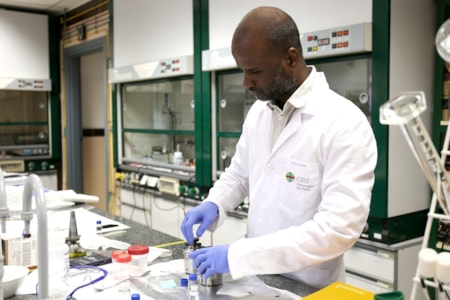
This academic year, the University welcomes the
researcher Chandrasekar Mayandi Subramaniyam, who has joined the work of the
Solid State Chemistry and Materials research group led by Professor Flaviano
García Alvarado in the Faculty of Pharmacy. This has been made possible thanks
to the award of a grant from the Marie Sklodowska-Curie Actions (MSCA-IF)
programme, within the framework of the European Research and Innovation
Programme 'Horizon 2020'. At the CEU USP
laboratories, he will carry out a project on new materials for sodium ion
batteries. He will investigate new synthesis methods to obtain vanadium
oxyfluorides and analyse the possible applications of using them as the
positive electrode of such batteries.
Dr Chandrasekar was a research fellow at the
Indian Institute of Technology, Madras and the Indian Institute of Technology,
Bombay. Subsequently, he did his doctoral thesis at the Institute for
Electronic and Superconducting Materials at the University of Wollongong Australia.
During his doctoral thesis he spent a year working at the University of Texas
at Austin (USA) under the guidance of Nobel Laureate (2109) John B.
Goodenough. Before joining the Faculty,
he was also a postdoctoral researcher at the KTH Royal Institute of Technology
in Stockholm.
As the researchers explain, these batteries are
set to replace lithium-ion batteries soon in some of their applications, such
as energy storage from renewable sources, thus relieving the pressure on scarce
and expensive lithium resources. Sodium is a more abundant metal and can be
considered an inexhaustible resource - the sea is rich in sodium, as the
researchers point out; the batteries would thus be much cheaper and would allow
energy storage on a larger scale from renewable sources.
The project entitled "Mixed Anion
Cathodes", in which Dr. Chandrasekar is involved, is led by Dr. Flaviano
García Alvarado, a professor at the Faculty of Pharmacy in the Research Group
on Solid State Chemistry and Materials, which has been working since 1998 on
various projects, with public funding of more than two million euros, on the
search for alternatives for lithium batteries used in computers, mobile phones
and vehicles.